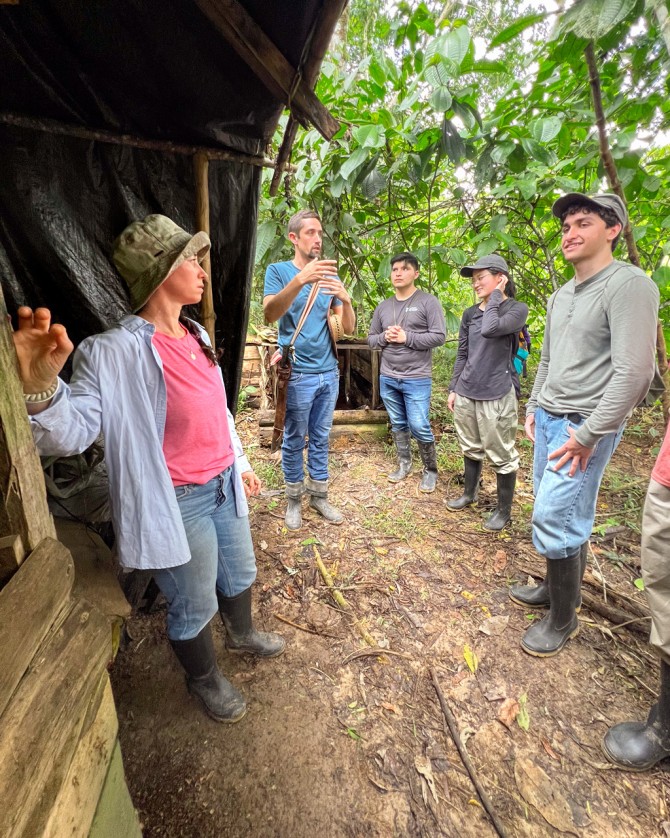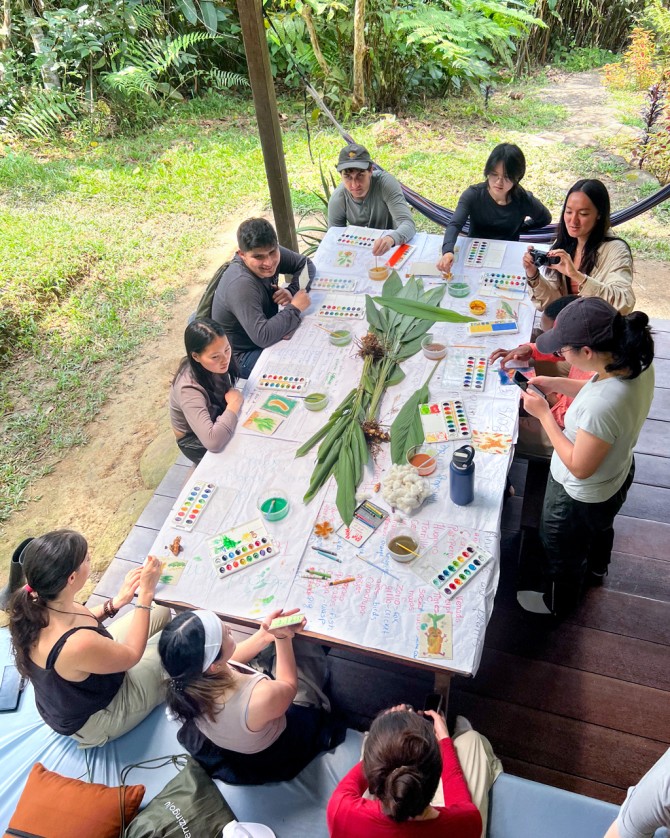Students help rural Peruvians grow turmeric business
By Laura Reiley, Cornell Chronicle
The Cornell students didn’t stay at a hotel, but off the grid, in huts with half walls, deforested grasslands whispering just outside. They were in the heart of the San Martin region of Peru, which has lost 14,000 square kilometers of forest, largely to illegal logging, mining, cattle ranching and illicit crops like coca.
Alexander De Leon ’26 and his 10-member team of fellow students came to Siendo Naturaleza, a Peruvian learning center dedicated to the restoration of the Amazon rainforest, with a specific idea of how to help. The deforestation in the region has had a profound effect on soil quality and biodiversity, with an increase in poverty levels, malnutrition and poor water quality.
The students’ idea: Develop plans for the community to grow and market products made from turmeric, the root of a native Asian plant that when ground and dried, creates a deep, golden-orange spice increasingly prized for its anti-inflammatory and antioxidant properties. Turmeric not only offers opportunities for business or revenue streams, it regenerates the soil.
“We were looking at this as something to scale, with the aim of growing a lot of turmeric,” De Leon said. “But a core theme of the week was that sometimes things aren’t just about profits. It’s about how you work with the community and how you give back. We had to slow down and ask them about the pace of life, about their traditional foods, about how they see medicine.”
The trip was part of the Grand Challenges program, which includes a curriculum and projects focused on pressing societal issues, at the Charles H. Dyson School of Applied Economics and Management in the Cornell SC Johnson College of Business.
De Leon spoke of “creating seeds of regeneration over time,” a nuanced way of thinking about intractable global problems that are the focus of Dyson’s Grand Challenges program. Offered over spring break, the “Social Impact Consulting in the Amazon Rainforest” trip allowed students to apply business skills toward real-world solutions for critical environmental and social issues, said Trent Preszler, professor of practice and director of the Dyson Leadership Program.
“Our goal is to empower students to think deeply about their roles as global citizens and future leaders, helping them realize the tangible impact they can have on building sustainable communities and resilient economic development in regions that have been negatively impacted by extractive industries such as timber, gold and oil,” he said.
Preszler said the students thought deeply, even as they coped with mosquito bites and wet socks.
“We had three criteria for a turmeric project,” said Jasmine Ren ’26, who is studying applied economics and management and information science. “It had to be able to be marketed locally. It had to be a product that didn’t require too much, technologically – it couldn’t be crazy complicated. And it had to get the community involved.”
Ren said the project wasn’t about trying to help the community sell turmeric on a massive scale, but helping them integrate the crop in order to replenish degraded soils.
They brainstormed three product ideas: a turmeric-based wood stain to combat the humid effects of the rainforest, a turmeric-based soap and a turmeric-infused herbal tea.
Tea emerged as the most promising choice, a decision that helped the team win the top prize in Dyson’s annual Grand Challenges Impact Competition on April 17. The team announced plans to donate its $10,000 in prize money to Siendo Naturaleza to develop the turmeric tea and sell it in Peru.
“We visited many locals, including going to a community field where they play volleyball and soccer. We also visited a hearts of palm co-op and a bird conservation center, where we saw rainforest that hadn’t been deforested,” said Angela Chen ’25, who studies applied economic management at Dyson. She said a big part of their learning experience was listening to the community they came to help.
“From this trip, all of us understood that in thinking about a turmeric product, of course it will generate income for the community, but it’s not Siendo Naturaleza’s goal to maximize profits,” she said. “Turmeric has so many benefits to soil. It can be planted among other crops and increase plant diversity. With all of these other benefits, our mission was to think about how we can add additional value to it.”
These immersive experiences cultivate a deeper understanding of the interconnectedness of business and society, said Sarah Wolfolds, assistant professor of strategy and business economics at the SC Johnson College of Business and academic director of the Grand Challenges Program.
“It is one way our curriculum embodies the Dyson motto: ‘Our Business is a Better World,’” she said. “More broadly, this outreach embodies Cornell’s mission to ‘do the greatest good’ by empowering students to create impact that’s locally grounded and globally informed.”
Media Contact
Adam Allington
Get Cornell news delivered right to your inbox.
Subscribe


